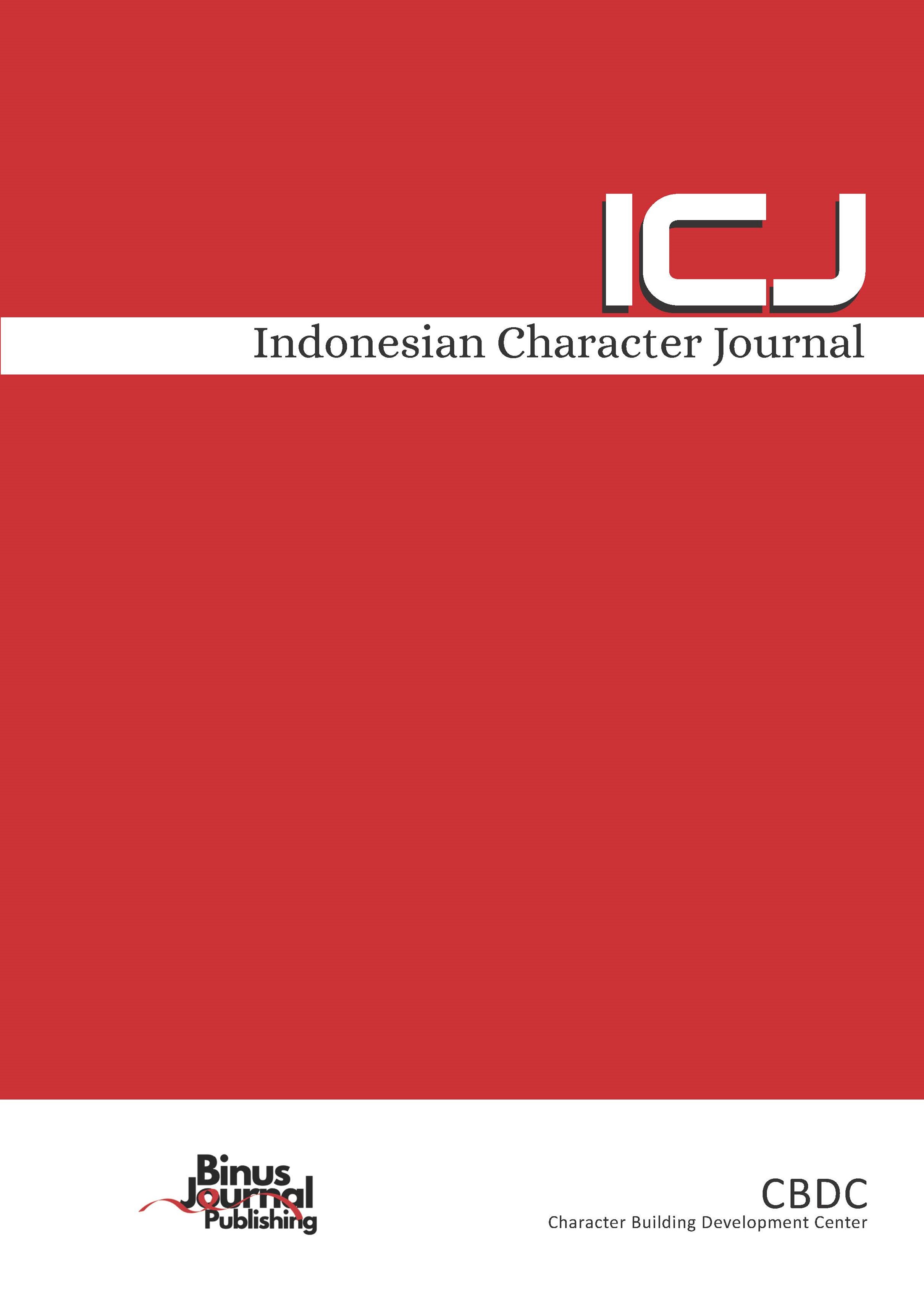Abstract
Each country has its own strategy for making character development as priority topic in human resource development. At different levels of education, each country makes efforts to implement character education both in the curriculum and in educational practice. So it is very possible that there will be differences in the results and quality of education from one institution to another or one country to another. This difference is what encourages researchers to conduct open studies on the German and Australian cultural models of character formation for the advancement of Indonesian character education. The aim of this research is to describe a comparison of character education in the curricula of three countries, Germany, Australia and Indonesia. This type of research is documentary research and qualitative descriptive methods. And based on analysis of different articles, it was found that these three countries have implemented character education both in their curriculum and in their educational activities. There are similarities and differences in the formation of the personalities of these three nations. These similarities and differences can be seen from three aspects, namely character education in a cultural model, curriculum and character education implementation strategies.
Setiap negara memiliki strategi tersendiri untuk menjadikan pembangunan karakter sebagai topik prioritas dalam pengembangan sumber daya manusia. Pada tingkat pendidikan yang berbeda, setiap negara melakukan upaya untuk menerapkan pendidikan karakter baik dalam kurikulum maupun dalam praktik pendidikan. Sehingga sangat mungkin sekali terjadi perbedaan hasil dan kualitas pendidikan satu lembaga dengan lembaga yang lain atau satu negara dengan negara yang lain. Perbedaan inilah yang mendorong peneliti untuk melakukan kajian secara terbuka terhadap model budaya pembentukan karakter Jerman dan Australia untuk kemajuan pendidikan karakter Indonesia. Tujuan dari penelitian ini adalah untuk mendeskripsikan perbandingan pendidikan karakter dalam kurikulum tiga (3) negara, Jerman, Australia dan Indonesia. Jenis penelitian ini adalah penelitian dokumenter dan metode deskriptif kualitatif. Berdasarkan analisis artikel yang berbeda, ditemukan bahwa ketiga negara tersebut telah menerapkan pendidikan karakter baik dalam kurikulumnya maupun dalam kegiatan pendidikannya. Terdapat persamaan dan perbedaan dalam pembentukan kepribadian ketiga negara tersebut. Persamaan dan perbedaan tersebut dilihat dari tiga aspek, yaitu pendidikan karakter dalam model budaya, kurikulum dan strategi implementasi pendidikan karakter.
DOWNLOAD PDF
References
Anggita Tiara Dewi. (2021), http://didaktis.xyz/sistem-pendidikan-di-jerman/
Balitbang Pusat Kurikulum Kemendiknas. (2010). Pengembangan Pendidikan Budaya dan Karakter Bangsa. Jakarta: Kemendiknas.
Candika Putri R, https://www.kompasiana.com/candikapr/5f8577ccd541df29bc2aa732/mengenal-pola-budaya-masyarakat-jerman, 13 Oktober 2020 16:47 Diperbarui: 13 Oktober 2020 16:51
D’ Cruz J and P. Langford (1990). Eds, Issues in Australian Education, (Melbourne: Longman Cheshire.
Eva Waldani: https://www.academia.edu/39724584/Problematika_Kuantitas_Dan_Kualitas_Pendidikan_Di_Indonesia
Frackman, dkk, Kebijakan Pendidikan Tinggi di Jerman: Dalam Goedegebuure, Leo et al (Eds), Kebijakan Pendidikan Tinggi: Perspektif Komparatif Internasional, Paris:Pergamon Press,
H. Mohle, Republik Demokratik Jerman: Sistem Pendidikan, B. R. Clarke dan Neave,(Eds), The Encyclopedia of Higher Education, Vol. 1, Oxford: Pergamon Press
Iriyanto Widisuseno, 2018), Pola Budaya Pembentukan Karakter Dalam Sistem Pendidikan Di Jepang, Kiryoku, Volume 2 No 4
John Francis Cramer dan George Stephenson Browne (1956, Pendidikan Kontemporer, New York: Harcourt Brace
J. T. Fey, Sistem Pendidikan Republik Federal Jerman. F. Husen dan Postlethwaite (Eds), Ensiklopedia Pendidikan Internasional. New York:Pergamon Press
Kudutaan Besar Australia Indonesia, https://indonesia.embassy.gov.au/jaktindonesian/penduduk_kebudayaan.html, 12 Mei 2022 00.30
Lintang Larissya, https://yoursay.suara.com/lifestyle/2022/01/24/163904/5-manfaat-menjadi-pribadi-yang-teorganisir-kamu-salah-satunya, Senin, 24 Januari 2022 | 16:39 WIB
L. Ingvarson dan Chadbourne, (Eds.), Menilai Pekerjaan Guru: Arahan Baru dalam Apparaisal Guru, Melbourne: ACER,
Pikiran Dunia, (https://www.pikirandunia.com/2022/02/kurikulum-indonesia.html).
Pendidikan Kewarganegaraan, https://ainamulyana.blogspot.com/2018/06/undang-undang-uu-nomor-20-tahun-2003.html, 1 Juni 2018
Robert F. Lawson, Pendidikan Rekonstruksi: Sekolah dan Universitas Jerman Timur setelah nifikasi oleh Rosalin M. O Princhard, (Resensi Buku), Dalam Tinjauan Pendidikan Komparatif, Vol. 44 No. 1, Februari, 2000
Saifullah Isri, (2015), Konsep Pendidikan Jerman dan Australia; Kajian Komparatif dan Aplikatif terhadap Mutu Pendidikan Indonesia, Jurnal Pendidikan Islam :: Volume IV, Nomor 1, Juni 2015/1436
Samovar, L. A., Porter, R. E. dan McDaniel, E.R. (2014) Communication Between Cultures. 7th edition. Jakarta, Salemba Humanika
Sri Suwartini, (2017), Pendidikan Karakter Dan Pembangunan Sumber Daya Manusia Keberlanjutan , Jurnal Pendidikan Ke-SD-an, Vol. 4, Nomor 1
Suyadi, (2020), Menelisik Konsep Pendidikan Jerman dan Australia sebagai Benchmarking Pendidikan di Indonesia, Jurnal Elkatarie, Jurnal iImu Pendidikan dan Sosial Vol.3, No.2
Downloads
Published
Issue
Section
License
Copyright (c) 2024 Servasius Balok

This work is licensed under a Creative Commons Attribution-ShareAlike 4.0 International License.
Authors who publish with this journal agree to the following terms:
a.
Authors retain copyright and grant the journal right of first
publication with the work simultaneously licensed under a Creative
Commons Attribution License - Share Alike that allows others to share
the work with an acknowledgment of the work's authorship and initial
publication in this journal.
b. Authors are able to enter into separate, additional contractual arrangements for the non-exclusive distribution of the journal's published version of the work (e.g., post it to an institutional repository or publish it in a book), with an acknowledgment of its initial publication in this journal.
c. Authors are permitted and encouraged to post their work online (e.g., in institutional repositories or on their website) prior to and during the submission process, as it can lead to productive exchanges, as well as earlier and greater citation of published work.
USER RIGHTS
All articles published Open Access will be immediately and permanently free for everyone to read and download. We are continuously working with our author communities to select the best choice of license options, currently being defined for this journal as follows: Creative Commons Attribution-Share Alike (CC BY-SA)

%20Indonesian%20Character%20Journal%20Indonesian%20Character%20Journal.png)

![MARKETING SERVICE BY HEART: JASA PIJAT IBU BROTO [76.233 VIEWS]](https://blogger.googleusercontent.com/img/b/R29vZ2xl/AVvXsEiLJ9xGgmwpaq5awWlyx4VSWfH6NlHK0qQD9PY11uegwUezuVnqDnPke2FGA247O2CrQrSH-s_qZfGnmItTUZcBeY_9rkHgTIrIi52Kg8aaWVZW4Y-KsA3Dlri_l6Ef10lQlsiKmK_BYWB10Of3s2nR3TmFe58xhSOu2RC4a8hphF3Ga6Tqbd5aBA3g/w72-h72-p-k-no-nu/IMG20220412174437.jpg)

.png)


![PERSIAPAN! Presentasi Sidang Tesis (Menjelang Tesis) [14.500 VIEWS]](https://blogger.googleusercontent.com/img/b/R29vZ2xl/AVvXsEj_KWeJfIFBwrj_QAxBgviSU0iCE9lKlHxVnY-BQz4gXThV9a2ZFheWtLxtotv93Wf_3nQ3BIX-ealq85Zi4tgpn6jo1CE9NOmovdZT9eH7DTM5oFs0wbCln49lItvWos24okS-Zv0qpu9f70qPkLGI7CbmVybO1AF1ogUb_bz6REVmKDivxcDbMkJt/w72-h72-p-k-no-nu/Screenshot%202022-05-15%20at%2020-29-37%20LembuTambunShop%20-%20Silahkan%20Koleksinya%20Kak!%20Tees.co.id.png)
![MASA PENSIUN [65 TAHUN] MAU BUAT APA? YUK KITA COBA BUAT DAFTARNYA!](https://blogger.googleusercontent.com/img/b/R29vZ2xl/AVvXsEgC6my1WEx2wQA-uWrf6bCUFzSuTTeveQOR523RAQwjVV452e8h_zdYMO9FGi-9UHTST4bz51HpG7DtIqTgNWZiTki89GQrcvCigHH8zs632GXtvq0rJeJ2RHmsuXUJcJuVG3Idxje7BfZFHduiEAJI0S7QWcE3KLKAxHiTUvWdrlhJnqUVQ-Sk1HRLm94/w72-h72-p-k-no-nu/sampel2(1).png)
0 Comments